[ad_1]
For decades, Presidents have played critical roles in international affairs — from Richard Nixon’s détente with China to Ronald Reagan’s force of will that toppled communism to Jimmy Carter’s brokered peace between Anwar Sadat and Menachem Begin. In these and countless other examples, past Presidents advanced American interests and inspired the world by wielding both formal constitutional powers, as well as the authority granted by foreign leaders who accepted their statements as US policy.
This isn’t the case with Trump, whose words foreign leaders can no longer take at face value. Fortunately, President Trump’s incompetence in foreign relations, while not a cure-all, can moderate the damage that he might otherwise cause. The more exposure the world has to this President, the less he matters. After all, communication is a two-way street, and the audience plays a significant role in determining whether someone’s words are accurate, meaningful, and safe to rely on.
In any prior administration, words such as these from the American President would place us at the precipice of war. But as norm-busting as they may be, we have become conditioned to view them as just the latest in an unbroken string of overheated comments. His words aren’t newsworthy because they will all have real world consequences but because in many instances they won’t — despite being uttered by the leader of the free world, they are heavily discounted by the world just the same.
Of course, as oddly comforting as Trump’s lack of global credibility may be, it reflects a sorry state of affairs. This administration has luckily not faced an acute national security crisis, such as a 9/11-style terrorist attack or an imminent threat of war. As has been the case throughout our history, when such circumstances arise, America needs a reliable and respected leader to guide the nation. And the way in which the President acts in moments such as these could determine the course of human history.
If faced with a national security crisis, Trump’s incompetence could pose serious problems. The void of US leadership could also damage the US’ global standing and push fledgling nations, such as Libya, to take their cues from Russia and China rather than from the United States. And then there’s Trump’s command over the nuclear arsenal, which is scary, given his penchant for tantrums. In a crisis, it’s hard to know where Trump’s impulses would lead the nation.
What’s more, there have been instances when President Trump’s words have foretold real policy movements with real-world consequences, such as his use of tariffs as an international trade tool with China and his threats of tariffs on Mexican goods in an effort to advance immigration-related ends.
But recognizing that he can cause damage does not mean that every oddball comment he makes will have a lasting impact. We are, for the time being, stuck with Trump and, fortunately, his incompetence has helped moderate what could otherwise be calamitous by spurring foreign leaders to ignore him.
What if foreign leaders are inclined to take him seriously and react as if his words had meaning? It is both my belief and continued hope that President Trump’s journey to irrelevancy on the world stage advances by the tweet, continuing to take further root so that we will soon see the day when it will not only be reasonable for world leaders to ignore Trump but it will be the only rational thing for them to do.
On the international stage, the one constant in modern history is that the American President is taken seriously. This is one norm that we should all be thankful Trump has broken. And hopefully, it is a norm that can be quickly restored once he is out of office.
[ad_2]
Source link


